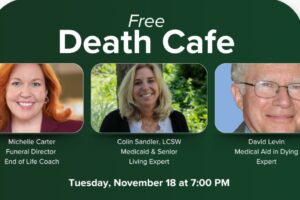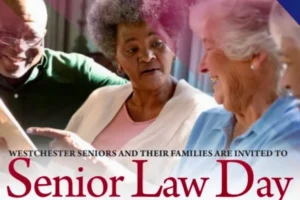It is very unsettling, indeed, to witness a loved one falling prey to Alzheimer’s. It’s hard to reconcile that your mother, father, aunt, uncle, or friend who looks the same, sounds the same, dresses the same, seems the same, cannot remember who you are. That’s a tough one.
My mother’s side of the family is prone to dementia. My great-aunt, back in the early 70’s, had “hardening of the arteries.” She and my uncle lived alone in their home with their two dogs and were doing just fine while my aunt’s condition was still 90% lucid and 10% forgetfulness. But then one day, my aunt got on the plane for her annual trip to Ireland to visit her sisters and brothers. When they met her at Shannon airport, she didn’t know who they were, where she was or how she got there. It was devastating all around. She and my uncle moved in with us and my aunt died two years later at 62. Her older sister, who had witnessed my aunt’s descent, succumbed to the disease herself 10 years later and finally their youngest brother fell victim to dementia during the last years of his life.
My mother, too, was getting more forgetful in her early to mid 80’s and I believe her lung cancer acted as a catalyst for her memory loss. She would ask me every five minutes if I would like a cup of tea and forget the topics we just spoke about. When friends would visit and engage her in conversation, she would turn to my father and ask, “Tom, what is it that I have again?” “Cancer, Mae. You have cancer,” he would reply. My mother would turn back to her friends and say matter of factly. “Oh, that’s right. I have the cancer.”
You want so much to be able to get through to them! You really believe that if you take their hands, hold their eyes with yours and talk intently about a past memory that you shared, it will somehow click, and they’ll say, “Oh yes, I remember now!” If it were only that easy.
It seems, unfortunately, that everyone knows someone with a form of Alzheimer’s, be it dementia or a more advanced form of Alzheimer’s. In the United Sates, there are currently 5.4 million people living with the disease – that’s one in eight people. If your loved one shows signs of dementia or Alzheimer’s disease, you may do some research on dementia care services or assisted living facilities like Harvest Home & Inwood Crossing that can help. Visit sites like terrazacourtseniorliving.com/assisted-living/your-home/ for more information.
Although a cure has not yet been found for this disease, research continues with financial support from well-known and ongoing fundraisers by organizations such as the Alzheimer’s Association, a national entity with local chapters. This research has helped scientists and doctors determine causes and effects of the disease, among other critical information, which helps to identify people who may be at risk. For example, according to the Alzheimer’s Association website, the following 10 symptoms are warning signs of Alzheimer’s disease:
- Memory loss that disrupts daily life
- Challenges in planning or solving problems
- Difficulty completing familiar tasks at home, at work or at leisure
- Confusion with time or place
- Trouble understanding visual images and spatial relationships
- New problems with words in speaking or writing
- Misplacing things and losing the ability to retrace steps
- Decreased or poor judgment
- Withdrawal from work or social activities
- Changes in mood and personality
If you notice any of these signs in yourself or someone you know, don’t ignore them. Schedule an appointment with your doctor. Also, you can also look into memory care and senior living services in Fallbrook Glen of West Hills and nearby areas.
Bethel Homes and Services is a long-time supporter of the Alzheimer’s Association. Team Bethel has participated in the local chapter’s fundraiser Walk each year in White Plains, as well as the Freedom Lake jump last winter in Dutchess County. In addition, Bethel’s Nursing & Rehabilitation Center in Croton-on-Hudson has a dedicated, secured memory-impaired unit.
For more information, please call 914-739-6700.




